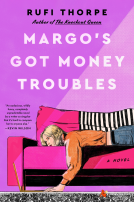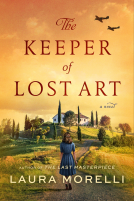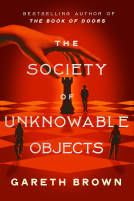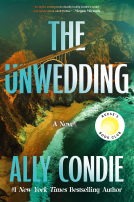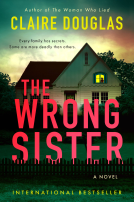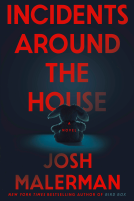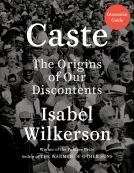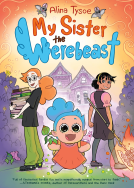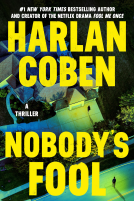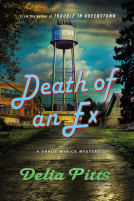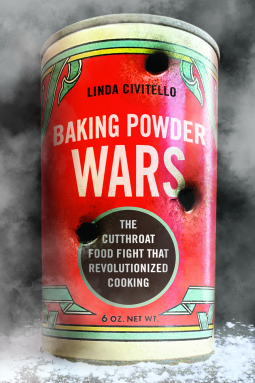
Baking Powder Wars
The Cutthroat Food Fight that Revolutionized Cooking
by Linda Civitello
This title was previously available on NetGalley and is now archived.
Send NetGalley books directly to your Kindle or Kindle app
1
To read on a Kindle or Kindle app, please add kindle@netgalley.com as an approved email address to receive files in your Amazon account. Click here for step-by-step instructions.
2
Also find your Kindle email address within your Amazon account, and enter it here.
Pub Date May 22 2017 | Archive Date Jun 12 2017
Description
Advance Praise
"A thrilling tale about the shenanigans of corrupt businessmen and politicians, especially the wonderful Chapter Seven."--Bruce Kraig, coeditor of The Chicago Food Encyclopedia
"Who knew that baking powder has such a complex history, one full of political intrigue, gender wars, health scares, and race relations? In this meticulously researched and entertainingly told book, Linda Civitello chronicles the evolution of home baking in America, along the way highlighting the roles of figures like Teddy Roosevelt and Lincoln Steffens in abetting baking powder’s successful rise."--Darra Goldstein, founding editor of Gastronomica: The Journal of Food and Culture
"Baking Powder Wars is an insightful and fascinating account of the advent and subsequent struggle for legitimacy of one of today’s most widely used ingredients in both home and commercial baking. Linda Civitello succeeds in making what might have been an academically dry topic come alive with erudition, grace, and humor."--Nick Malgieri, author of Bake!
"It's just an innocuous white powder in a can at the back of the closet. Or is it? Linda Civitello’s history shows how baking powder precipitated vicious competition in big business, raised concerns about chemical adulterants in food, and transformed home cooking. Without baking powder, there would be no fluffy cakes and pancakes, no biscuits, no muffins, and no cookies, in short, no American cuisine as we know it."--Rachel Laudan, author of Cuisine and Empire: Cooking in World History
"With Baking Powder Wars, Linda Civitello takes her readers on an interesting and learned journey about a little-known subject: The history of leavening agents. I'm grateful for this detailed backstory on what makes bread rise to the occasion."--Adrian Miller, author of the James Beard Award-winning book Soul Food: The Surprising Story of an American Cuisine, One Plate at a Time
"Linda Civitello has mined her subject thoroughly and documented how it changed American baking to satisfy our hurry-up attitude toward life and food in general, as we embraced a quick and easy solution to the tiresome problem of supplying the family table. Along the way, Civitello records in detail the fundamental history of a business that is almost uniquely American--the baking powder business. Who knew that baking powder could be such a rich resource?"--Nancy Harmon Jenkins, author of Virgin Territory: Exploring the World of Olive Oil
"Baking powder was not a topic high on my interest level before I read this book, but I'm fascinated by the subject now. A great job of getting into the topic and placing it in a broader perspective."--Andrew F. Smith, editor of The Oxford Encyclopedia of Food and Drink in America
Available Editions
| EDITION | Other Format |
| ISBN | 9780252082597 |
| PRICE | $19.95 (USD) |
| PAGES | 264 |
Links
Featured Reviews
 catherine h, Reviewer
catherine h, Reviewer
Fun book, actually! I've used Clabber Girl my whole life! My mother and grandmother also used it. Who knew there was such an interesting history about baking powder, baking soda, and other similar products? For the most part, it was actually enjoyable (I love quirky social history tales! So maybe it's just me!). Worth a read if you're a foodie, historian, or just place curious.
 David W, Media/Journalist
David W, Media/Journalist
It transpires that baking powder is a microcosm of all that is wrong with the system. From creating demand where there was none, to lying, cheating, stealing, spying and bribing the entire senate of Missouri, the story of baking powder is a lively tale, unexpected, and informative. Linda Civitello says “It was an American invention and it was crucial in creating a uniquely American cuisine that has spread throughout the world.” That cuisine is mostly white, light and sweet: cakes, doughnuts, biscuits, muffins, cupcakes and cookies. They are now the basis of diet, worldwide.
Just like in the kitchen, there is a lot of prep work. Civitello puts women in their place, experimenting, inventing, and investigating ingredients and processes, pre baking powder. They communicated by the cookbooks they wrote. They messed with longstanding family recipes that did not work in the colonies, where the flour was different, corn was more available than wheat, and a distinct preference for light and sweet soon developed. Women were in charge of baking, and they ran with it. They innovated. Then however, men invented baking powder, and fought over it. Women were there to purchase it, and the men created a whole new way of living by getting them to buy it continuously.
When the big four competitors decided to take on the women who insisted on making their leavening from scratch, their first thought was to take over the cookbook. They could add color plates and fancier layouts in these corporate cookbooks. And plaster them with their brand. They also competed in trade cards that were popular to collect (and which eventually morphed into bubblegum trading cards). And almanacs. Soon, they took to badmouthing each other via their door to door salesmen, their print advertising and their packaging. They tried to get laws passed banning the competition’s product. They bought media so effectively the media were not permitted to print replies and rebuttals that might criticize their product. With one or two exceptions, they ran their employees ragged, paid women less than men, and fought regulation, food safety and labor standards. So very little has changed.
Civitello’s life is food history. She collects it, researches it and writes about it. It looks like a niche she could simply own, and most of the images are from her own collection. Her book is a delight. She interlaces the absurd history with jabs at the male-dominated world and the racists – both men and women, who dominated it. Women stole recipes from their slaves and ads portrayed women at ease thanks to the black “help”. (There is a particularly nasty description of the revered Marjorie Kennan Rawlings.) Civitello lays it all our out for readers to judge. This mountain via molehill has a variety of villains and a variety of impacts. It moves quickly and brings back all kinds of pop culture memories. It is a sweet treat on its own.
David Wineberg
Baking Powder Wars is a well-researched, highly accessible and overall fascinating book all about, well, you guessed it, baking powder. I had no idea of the history of this crucial baking product and I was blown away by how interesting that this book was. Rumford has been on my shelf for years and now I know a lot about how it got there. If you are a baker and you love food history, this is a must-have for your TBR pile.
First patented in 1856, baking powder is the invented substance that is the basis of all white baked fluffy foods that we think of as staples today. Pancakes, muffins and all that yummy stuff would not exist without it. This book documents the story of baking powder, and it is full of intrigue, backstabbing, and excitement. The entire Senate of Missouri was bribed at one point, and dozens of woman outright stole recipes from their slaves and claimed them as their own. The baking powder industry tried to get their competitors product banned, and the biased media helped them along the way. This glimpse into America’s absurd history entertained me. From the publisher: Civitello shows how hundreds of companies sought market control, focusing on the big four of Rumford, Calumet, Clabber Girl, and the once-popular brand Royal. She also tells the war’s untold stories, from Royal’s claims that its competitors sold poison, to the Ku Klux Klan’s campaign against Clabber Girl and its German Catholic owners.
I read a DRC of this book from Net Galley in exchange for an honest review. You can read it on or around June 15, 2017.
 Kathleen W, Reviewer
Kathleen W, Reviewer
I think that Linda Civitello must have dreams about biscuits and baking powder. Wow. What an incredible amount of research she has done for this book.
Baking Powder Wars was published by the University of Illinois Press. In my experience, books published by a university press can be a bit dry and more academic than a casual reader is looking for. This book starts out that way, as the first few chapters set up the cooking rituals of pre-baking-powder America, its not inaccessible but it's pretty research-dense. However, stick with it. Its important to set the scene for the leavening options before the baking powder to set the scene for war war! war!! My jaw dropped at one point as I read, mouth agape, about the drastic measures some of the baking powder companies took to try and dominate the market. Or should I say, "flatten" their competition? (No, I shouldn't say that. Too easy.)
The research is impressive and the tactics described are astounding. I had no idea baking powder was such big business. The more I read, the more I enjoyed it, and I appreciate the amount of information the author shares about the families that were behind many of the big companies at war with one another in the 19th & 20th century. They started off small and built an empire that went beyond the single product.
 Reviewer 265633
Reviewer 265633
OMG...what can I say? I started reading this book purely by the title wondering just how could one write about the wars of baking powder. The amount of information that is crammed into this book is amazing, and laid out in an almost addictive fashion to keep reading and not in a dry information way. Have a foodie on your list to buy for? This book is perfect!
 Librarian 391714
Librarian 391714
Fascinating history of a pantry staple. Didn't expect to find it to be so engaging but page after page I was drawn into the text, learning about the complex back story to such a versatile ingredient. I also enjoyed seeing the old advertisements as well.
Let me start by saying that I have been in the culinary world for many years now - as a culinary student, professional baker, owner of an Italian restaurant and catering business. So when I had an opportunity to read Baking Powder Wars by Linda Civitello, I jumped at it!
I know that baking powder may not be at the top of your reading list, and you are probably saying to yourself, "what could be so fascinating about baking powder?". Believe me, after reading this book you will definitely change your thoughts on that subject!
Linda Civitello takes us on an in-depth journey of how hundreds of companies fought for market control, mainly talking on the 4 main companies we all know - Rumford, Calumet, Clabber Girl, and Royal. From the Publisher: She also tells the war's untold stories, from Royal's claims that its competitors sold poison, to the Ku Klux Klan's campaign against Clabber Girl and its German Catholic owners.
Baking Powder Wars: The Cutthroat Food Fight that Revolutionized Cooking is a well-researched, entertaining, and a beautifully written book that any baker, food historian or anyone in the culinary industry should read!
I read this book from Net Galley for an honest review.
Publication Date: June 15, 2017
Interesting deep dive into food history with just enough gloss and adventuring for the lay reader - it's always intriguing to have the curtain pulled back on a calm surface, very Emerald City. Ms. Civitello's writing style is accessible and obviously imbued with a love of the subject matter, she seems to be having a great time and it definitely comes through on the page.
 Anita W, Reviewer
Anita W, Reviewer
Who would have thought that a book about baking powder would be a truly riveting read? It's filled with factual and technical detail, but Linda Citivello has taken care to present it in a very readable way, making it totally accessible. In over 50 years of reading, this is one of the best non fiction books I've ever read. It not only brings a relatively uninteresting subject to life, it's also a huge slice of social history, European and American. I absolutely loved this book and it's one I shall rave about for a long time.
I must confess I've always taken baking powder for granted. As a British reader, I grew up with Borthwicks. I knew the difference between plain and self raising flour, I was taught how to use yeast as a leavening agent and I've never really thought further about how and why I use these products. Wow, this book is a real eye opener, particularly if you're a keen home cook; there are so many recipes within the text it's also a baking journey.
What really stands out for me is the way the author has turned this potentially dull subject into a lively and vibrant read. I truly wanted to know what happened next and with meticulous research and easy to access references, this book is a joy in every way. There's more to explore and it's taken me on a journey I never envisaged.
European social history is considered in a unique way. Emigrants to America from Britain, Germany, France etc took with them their traditions, each uniquely influenced by brewing practice. Different beverages, different methods and yeast residuals. Absolutely astonishing and I had no idea that a single chemical would influence not only home cooking, but development of an industry based solely on a raising agent. Cakes, biscuits, scones, shelf life, taste, packaging...a seemingly endless list resulting from one product. None of these were produced on a commercial scale before baking powder.
And that's before we even think about social history in terms of women, brand identification, advertising, product placement. Baking powder was first patented in 1856, around a hundred years before I was born. I had no idea that a product we all take for granted would have such a profound influence on both diet and culture. If you chose just one non fiction book to read, let it be this. An astonishing achievement and a stunning book.
“Baking Powder Wars” by Linda Civitello should be on the “must read” list of every foodie. I am not a “foodie” but since I know some, I was intrigued by the title. I had no idea that baking powder played such an important, even pivotal, role in what we eat, cook, and do.
This book is not about an obscure little business competition between baking powder companies; it outlines a nasty, cutthroat competition to dominate baking, commerce, and society, a full-fledged war that changed the social order. Who knew that baking powder influenced home-making, American food, cookbooks, cooking methods, advertising, recipes, trade unions, war rations, flavorings, trading cards, oh, and brought about CUPCAKES AND DONUTS?
A tremendous amount of quality research went into this book as shown in the extensive details. It was not the dry and tedious read one might expect from a “history book.” It was actually interesting and very easy to read; it was a “thriller” set in the food world. I ‘m still not a real foodie; I have not started photos online posting of food I am eating, but I have certainly gained a new appreciation for the lowly red can of baking powder stuck in the back of my cupboard.
When I received a copy of this book in exchange for my review, I did not expect much, but I was certainly wrong. I really enjoyed the trip through history, and certainly learned a lot about a product that changed more of civilization than I would have believed possible.
 Beth C, Reviewer
Beth C, Reviewer
I received an early copy of this book via Netgalley.
I have a deep interest in 19th century history. It provides the background for several of my novels. I'm also a food blogger and all-around foodie. I am endlessly fascinated by the role of food in book world-building and in our own history.
Therefore <i>Baking Powder Wars</i> is perfect for me. At times, it's confusing because of the sheer number of names, but it never ceases to be interesting. The book begins with a discussion of leavening ingredients over time, starting with yeast and pearlash, and the development of different types of baking powder over the 19th century. The companies truly did wage a nasty political and commercial war for dominance, and two companies ultimately emerged victorious: Clabber Girl and Calumet. That's no spoiler, as I bet most folks have one or the other in their cabinet. (I was raised with Clabber Girl.)
What really interested me, though, were the cultural ramifications of baking powder. It obviously freed women from the kitchen and the hours and days it might take to create yeast bread, but baking powder also became integrated in different cultures and regions of the United States, and gradually changed traditional recipes to become baking powder recipes. Southern-style biscuits are a prime example of this. As baking powder became a symbol of modernity and civilization, it also played a part in controlling Native Americans on reservations (baking powder and flour were allotted to them, and became part of the reservation food Indian fry bread, which didn't exist before then) and perpetuating racist stereotypes of blacks through the 1930s and onward.
If you have any interest in food and history, seek out this book. I'll never look at my baking powder the same way again.
 Leanne M, Librarian
Leanne M, Librarian
History buffs and foodies rejoice! Everything you ever wanted to know about the origins and history of baking powder can be found here. It's quite fascinating!
Who knew the world of BAKING POWDER was SO dramatic? I didn't! Reading this book is really like reading a history or the american life. How products were bought from small stores, and then began to be made in the home, and started the decline of the small stores. It's really a look at how a simple product like baking powder can really illustrate how changes occurred over the past 100 years! It's amazing to me how a simple product that I have always cooked with, literally changed America! Whether you're partial to one brand or another, even if you aren't a history buff, this book is one to really make history come alive for you! It comes out in June, so put it on your MUST read list now!
http://blesstheirheartsmom.blogspot.com/2017/05/history-corner-baking-powder-wars-by.html
 Margie G, Media/Journalist
Margie G, Media/Journalist
F 50x66
Margie Gibson's review May 06, 2017 · edit
it was amazing
If baking powder doesn't seem substantial enough to merit an entire book, that's only because its history and background have not been widely explored and remain generally unknown. Linda Civitello's carefully researched book has finally opened a window onto a fascinating subject and era in US history. The book is interdisciplinary in nature, shedding light on the science and chemistry behind baking powder, the international exchange of ideas and scientific knowledge that enabled the powder's development, the history of chemical leavening agents, politics and corruption, suspicion of foreigners (in this case, Germans), and insights into the role baking powder played in the economic history of the US, as well as marketing, feminism, and social issues.
I found especially interesting the book's exploration of how baking powder revolutionized women's lives, freeing them from the necessity of spending long hours kneading and baking bread for their families. The popularity of baking powder in the US also explains how baking styles here developed differently from European baking--US cooks relied much more extensively on a chemical leavening action, while more traditional European cooks relied on beating bubbles into the batter and using eggs as a leavening. This difference created new American baked goods such as cookies, quick biscuits, cobblers, and light fluffy cakes.
Baking Powder Wars provides fascinating insights into a unique American product--insights that will change the way you look at a marvelous invention that we have too long taken for granted.
 Aisha H, Reviewer
Aisha H, Reviewer
Greatly researched, I learned a lot. I never even knew that there was any type of issue surrounding this, and no wonder what is going on around other food items we consume everyday.
 Bonnye Reed F, Reviewer
Bonnye Reed F, Reviewer
I received a free electronic copy of his history from Netgalley, Linda Civitello, and University of Illinois Press in exchange for an honest review. Thank you all, for sharing your hard work with me.
I am old, and I have always dearly loved to cook. I am so old that I remember when every country road we traveled had Clabber Girl ads painted on old barns. One of my main complaints when I was a new cook in the late '50's and early '60's was the lack of any sort of consistency in recipes that included a leavening of any sort. As you cook, over the years, you make up your own rules, as did the ladies and gentlemen who wrote the receipt books quoted in this fine history of baking powder and cutthroat advertising. And thanks to the baking powder wars our quick breads, cookies, muffins and biscuits are dependably great every time we make them. But I knew all that when I picked up this book.
What I didn't know that would fill volumes is packed tightly into this very readable journey as Linda Civitello brings us through centuries of the evolution of cooking. Thank you for all the great effort obvious in this work, Ms. Civitello. I am full of facts and hungry for my lemon quick bread. And my Daddy's recipe for Bundt cake. And my daughter's Ranger cookies.
 Laurie B, Reviewer
Laurie B, Reviewer
Before there baking powder was invented, there were no fluffy cakes, no cookies, no muffins, no biscuits, and no quick breads. Everything had to be leavened with yeast, and since there was no dried yeast available at the grocery store, the baker had to capture and store their own live yeast, as one does sour dough starter these days. It was a lot of work- building up a starter, kneading, and allowing bread two or three rises took a day and a half. There were yeast raised pancakes and biscuits, just like there are sour dough versions of those today, but they weren’t fast and no one baked something on the spur of the moment. Baking powder- even those made at home- changed all that. Now you could bake something in an hour- and the texture was totally different.
This book- which actually reads like a thesis and I do wonder if that was its first incarnation- shows the history of the various mixtures used as baking powder. It also shows us the war between the various large sellers of baking powder- it was surprisingly nasty. Today, with all the mixes on the shelves and all the pre-made baked goods available, one wouldn’t think there would be big money in simple baking powder, but there was.
The first baking powders were homemade, where the home baker combined various ingredients to create a leavener. Some formulations had to be done immediately before baking because moisture caused them to go off right away. Some formulations were double acting- they started giving off gas when mixed with moisture, and were triggered again by the heat of the oven (or the griddle, if making pancakes). Some had aluminum- something many of us cringe at today. Because there were several formulations, cookbooks had to include tables showing what changes had to be made for the different types and brands. All of this experimentation was made in people’s homes, not in labs.
This is a great social history book. Baking powder really did change the way we eat. It didn’t change bread, but it did make a whole new world of baked goods available. And one could make quick breads with it, even though those don’t make great sandwiches- the crumbly texture of baking powder breads makes them fall apart easily whereas yeast breads stay together because of the springy texture of gluten.
There was a lot about the wars between the companies manufacturing the various baking powders that I found myself skipping. The book is incredibly detailed; the author did a lot of research in original records, in both the economic field and the social. If you’re interested in how life was lived in the past, it’s a great book, albeit over long at times. Four stars out of five.
 Jennifer P, Media/Journalist
Jennifer P, Media/Journalist
Food historian Linda Civitello takes readers on an eye-witness, time traveling adventure of the truly cutthroat world of the creation, packaging, and marketing of baking powder. The author of "Baking Powder Wars" has researched every last teaspoon of America's relationship with bread and all things baked and nimbly provides a dramatic narrative of non-stop corporate dirty dealing that includes bribing government officials and journalists, as well as enthusiastic and colorful misdirection by advertising.
Civitello was a guest on my podcast Madame Perry's Salon and was as energetic and entertaining as her book.
First sentence: Business is war. Cooking is chemistry. Food is political.
Premise/plot: At its simplest, Baking Powder Wars is just that a history of the evolution/revolution of baking powder. The book begins pre-baking-powder-era and tells the story of what once was, of how bread [and cakes, etc.] used to be made. It then goes step by step through its evolution/revolution. [If it sounds dramatic, well, it's for good reason. It's a story of industry, corporations, commercialization and advertising, espionage, bribery, politics...and plenty of homemaking and 'domestic arts.' It has some to do with the role of women inside the home, and the role of the home inside society. The author uses baking powder to tell the story of convenience, of our love affair with convenience--fast, easy, cheap, consistent. This book truly offers a little something to every reader. It's got recipes. It's got stories about cookbooks and the role they play in society. It's got tension--as companies (and families who own companies) BATTLE it out literally and figuratively for supremacy. You might think naturally this would involve advertising, media, and market space...but it includes actual politics and politicians. It's also a history of what we eat, where we eat, how we eat, etc. (Bread, quick bread, muffins, pancakes, doughnuts, cakes, cupcakes, etc.) What we eat has definitely evolved through the centuries. It isn't just a story of one product--but of many. (Think Bisquick, Martha White, cake-mixes, etc.)
My thoughts: Until the last little bit--second half of last chapter--this one was actually fairly absorbing. I found that while it covered many subjects and seemed to present facts and factoids almost at random, it was almost always interesting and entertaining. The last half of the last chapter brings readers "up to date" on the families who started the big baking powder companies. These "updates" had nothing to do with food, advertising, cooking, etc. Most of them had to do with RACING. And it was like WHY IS THIS IN HERE? DO I CARE ABOUT RACE CARS? NO, I DO NOT. But so much of this one was interesting to me.
This one admittedly won't be for every reader. But for those who have an interest in the subject--be it food, cooking, baking, domestic arts, advertising and marketing, business, history of cookbooks, history of supermarkets, history of society/culture "becoming" modern and industrialized...I think this one has a little bit of everything.
